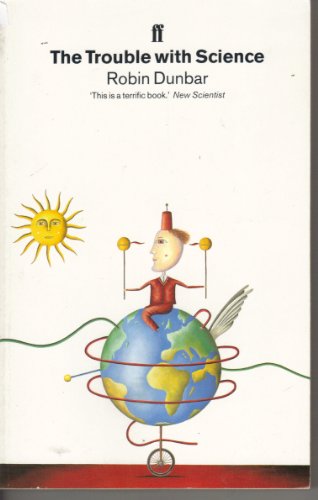Items related to The Trouble with Science

Synopsis
The 'trouble' with science began in 1632, when Galileo demolished the belief that the earth is the centre of the universe. Yet despite the bewildering success of the scientific revolution, many continue to hanker after the cosy certainties of a man-centred universe, and young people increasingly turn away from science.
In The Trouble with Science, Professor Robin Dunbar launches a vigorous counter-blast. Drawing on studies of traditional societies and animal behaviour, his argument ranges from Charles Darwin to Nigerian Fulani herdsman, from lab rats to the mathematicians of ancient Babylonia. Along the way, he asks whether science really is unique to western culture - even to mankind - and suggests that our 'trouble with science' may lie in the fact that evolution has left our minds better able to cope with day-to-day social interaction than with the complexities of the external world.
"synopsis" may belong to another edition of this title.
About the Author
Robin Dunbar is currently Professor of Evolutionary Anthropology at Oxford University and a Fellow of Magdalen College. His principal research interest is the evolution of sociality. He was elected a Fellow of the British Academy in 1998. His books include The Trouble with Science, 'an eloquent riposte to the anti-science lobby' (Sunday Times), and Grooming, Gossip and the Evolution of Language. The Human Story was described as 'fizzing with recent research and new theories' in the Sunday Times and 'punchy and provocative' by the New Scientist. How Many Friends Does One Person Need?: Dunbar's Number and Other Evolutionary Quirks was published in 2010.
"About this title" may belong to another edition of this title.
FREE shipping within United Kingdom
Destination, rates & speedsSearch results for The Trouble with Science
The Trouble with Science
Seller: Bahamut Media, Reading, United Kingdom
Condition: Very Good. Shipped within 24 hours from our UK warehouse. Clean, undamaged book with no damage to pages and minimal wear to the cover. Spine still tight, in very good condition. Remember if you are not happy, you are covered by our 100% money back guarantee. Seller Inventory # 6545-9780571174485
Quantity: 2 available
The Trouble with Science
Seller: AwesomeBooks, Wallingford, United Kingdom
Condition: Very Good. This book is in very good condition and will be shipped within 24 hours of ordering. The cover may have some limited signs of wear but the pages are clean, intact and the spine remains undamaged. This book has clearly been well maintained and looked after thus far. Money back guarantee if you are not satisfied. See all our books here, order more than 1 book and get discounted shipping. . Seller Inventory # 7719-9780571174485
Quantity: 2 available
The Trouble with Science
Seller: Goldstone Books, Llandybie, United Kingdom
Paperback. Condition: Good. All orders are dispatched within one working day from our UK warehouse. We've been selling books online since 2004! We have over 750,000 books in stock. No quibble refund if not completely satisfied. Seller Inventory # mon0004575494
Quantity: 1 available
The Trouble with Science
Seller: WeBuyBooks, Rossendale, LANCS, United Kingdom
Condition: Good. Most items will be dispatched the same or the next working day. A copy that has been read but remains in clean condition. All of the pages are intact and the cover is intact and the spine may show signs of wear. The book may have minor markings which are not specifically mentioned. Seller Inventory # wbb0023476559
Quantity: 1 available
The Trouble with Science
Seller: WorldofBooks, Goring-By-Sea, WS, United Kingdom
Paperback. Condition: Very Good. The book has been read, but is in excellent condition. Pages are intact and not marred by notes or highlighting. The spine remains undamaged. Seller Inventory # GOR001296029
Quantity: 2 available
Trouble with Science
Seller: Better World Books Ltd, Dunfermline, United Kingdom
Condition: Very Good. Ships from the UK. Former library book; may include library markings. Used book that is in excellent condition. May show signs of wear or have minor defects. Seller Inventory # 12615427-6
Quantity: 1 available
Trouble with Science
Seller: Better World Books Ltd, Dunfermline, United Kingdom
Condition: Very Good. Ships from the UK. Used book that is in excellent condition. May show signs of wear or have minor defects. Seller Inventory # GRP86033214
Quantity: 1 available

